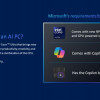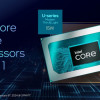How Intel's battle with NVIDIA over Core i7 impacts Apple
A technology licensing suit between Intel and NVIDIA over controller chipsets and the next generation of Intel's Core i7 CPUs may complicate Apple's immediate plans for the next iMac and Mac Pro, and disrupt the company's long term strategy for standardized GPU acceleration using OpenCL.
The suit relates to a disagreement between Intel, the maker of the Core 2 Duo CPUs used in Apple's MacBook line and its desktop Macs (apart from the high end Mac Pro, which uses Intel's Xeon "Harpertown" CPU), and NVIDIA, which last year expanded its role with Apple as a GPU provider into one where the graphics company now supplies the chipset-on-a-chip controller that serves as the glue between Intel's CPU and everything else in the computer.
Intel and NVIDIA teamed up in 2004 in a patent licensing agreement that resulted in NVIDIA making a competitive move into Intel's chipset business with its MCP79 chipset platform. Last year, Apple became the first PC vendor to adopt NVIDIA's one-chip controller in its MacBook line. The move not only simplified and improved the architecture of Apple's notebook machines, but also provided significantly better graphics compared to the Intel controller chips it had been using.









































































